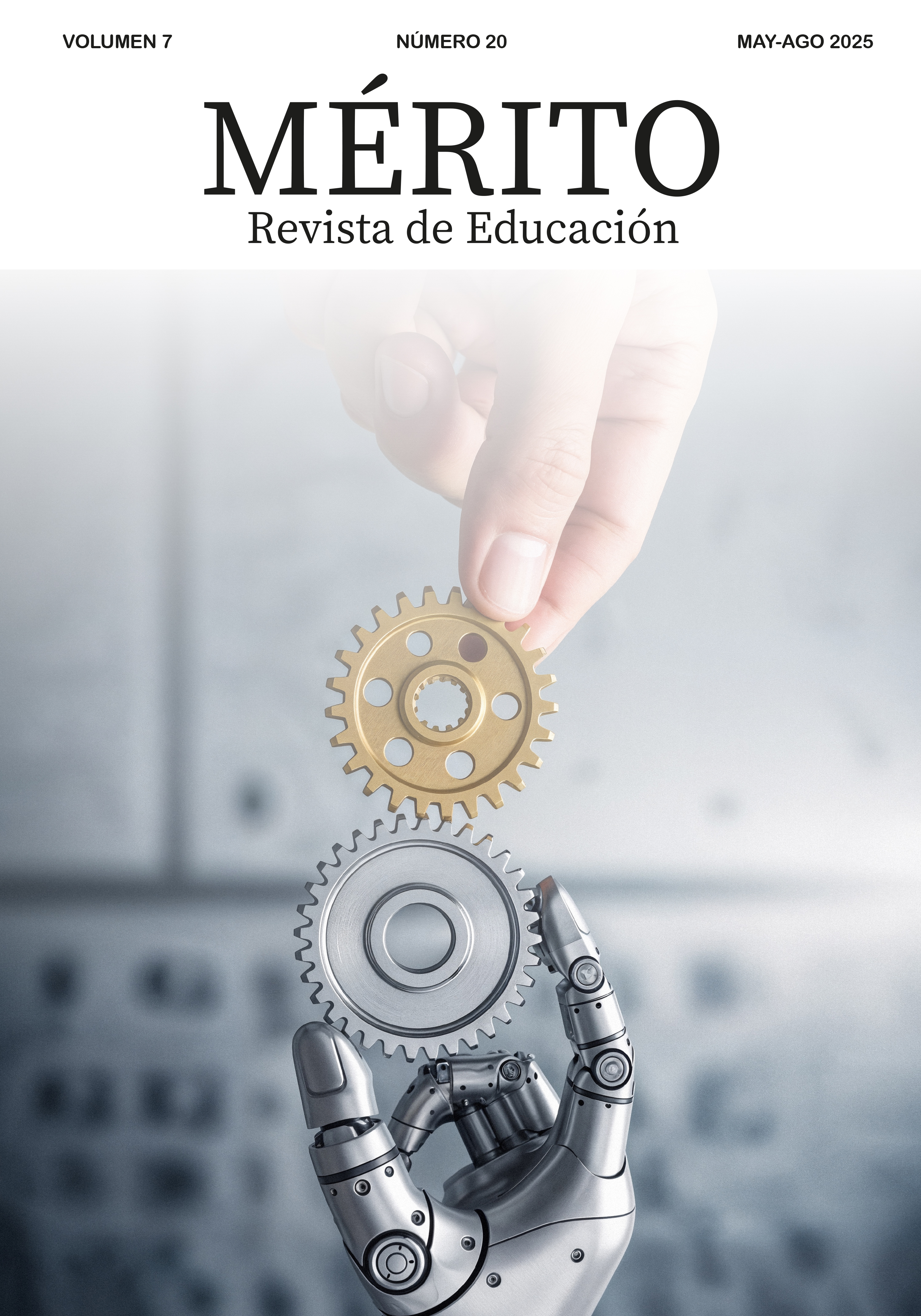Estrategias didácticas para enseñar estadística a futuros docentes de Educación Inicial
Teaching strategies for teaching statistics to future early childhood education teachersContenido principal del artículo
Este estudio analizó el impacto de diversas estrategias didácticas en la autoeficacia docente de estudiantes de Educación Inicial en relación con la enseñanza de la estadística. Se empleó una metodología mixta con diseño descriptivo-correlacional, que combinó cuestionarios, observación de aula y entrevistas semiestructuradas con 71 estudiantes mujeres. Los resultados destacaron la frecuencia y relevancia del andamiaje, el aprendizaje activo y la retroalimentación formativa como prácticas predominantes. Se identificó una relación positiva entre dichas estrategias y la percepción de autoeficacia docente, especialmente en contextos urbanos. Se concluyó que integrar estas metodologías en los programas formativos fortalece significativamente la preparación profesional de futuras docentes y subraya la importancia del entorno institucional para su implementación efectiva.
This research aimed to analyze the impact of various teaching strategies on the teaching self-efficacy of Early Childhood Education students concerning statistics instruction. A mixed-methods approach with a descriptive-correlational design was applied, combining questionnaires, classroom observation, and semi-structured interviews with 71 female students. The findings revealed that scaffolding, active learning, and formative feedback were the most frequently employed and impactful strategies. A positive association emerged between these strategies and perceived teaching self-efficacy, particularly in urban settings. It was concluded that incorporating such methodologies into teacher education programs substantially enhances professional readiness, while also emphasizing the key role of institutional context in their successful application.
Descargas
Detalles del artículo
Adewusi, O. E., Al Hamad, N. M., Adeleke, I. J., Nwankwo, U. C., & Nwokocha, G. C. (2023). Adaptive teaching strategies in early childhood education: A review for Nigeria and the UK. International Journal of Applied Research in Social Sciences, 5(8), 575-589. https://doi.org/10.51594/ijarss.v5i8.575
Altamirano Cortez, S. P., Taco Taco, M. N., Silva Delgado, M. de J., & Torres Peña, C. M. (2025). Estimulación del pensamiento científico mediante la realización de experimentos en el nivel de Educación Inicial. Revista Escuela, Familia y Comunidad, 4(1), 65-75. https://doi.org/10.48190/revefc.v4n1a5
Carrillo Puga, S. E., León Reyes, B. B., Ulloa Hernández, T. S., & Villacres Arias, G. E. (2024). El rol de las revistas científicas en la promoción de prácticas pedagógicas innovadoras. Acción, 20(Especial), 100-112. https://accion.uccfd.cu/index.php/accion/article/view/351
Cohen, J. (1988). Statistical power analysis for the behavioral sciences (2nd ed.). Lawrence Erlbaum Associates. https://utstat.utoronto.ca/brunner/oldclass/378f16/readings/CohenPower.pdf
González Granda, L. M., Reyes Espinoza, M. G., & Macias Alvarado, J. M. (2024). Tecnología y enseñanza virtual en la educación inicial: Un nuevo paradigma. Revista Escuela, Familia y Comunidad, 3(1), 45-58. https://doi.org/10.48190/revefc.v3n1a4
Han, F. (2021). The relations between teaching strategies, students' engagement in learning, and teachers' self-concept. Sustainability, 13(9), 5020. https://doi.org/10.3390/su13095020
Han, J. (2021). Scaffolding pre-service teachers' statistical learning: A structured feedback model. Journal of Teacher Education for Sustainability, 23(1), 83-94. https://doi.org/10.2478/jtes-2021-0007
Harmanto, B., & Rahmawati, I. (2022). Upgrading the early childhood education teacher capacity in introducing English with a simulation strategy. ELLITE: Journal of English Language, Literature, and Teaching, 7(2), 112-125. https://doi.org/10.32528/ellite.v7i2.8824
Landis, J. R., & Koch, G. G. (1977). The measurement of observer agreement for categorical data. Biometrics, 33(1), 159-174. https://doi.org/10.2307/2529310
Lira, F. L., & Carvalho, L. (2022). Curiosity and research: Developing statistical literacy in early childhood education. In Proceedings of the Eleventh International Conference on Teaching Statistics (pp. 145-152). International Association for Statistical Education. https://doi.org/10.52041/iase.icots11.t2d1
Matsumoto-Royo, C., & Ramírez-Montoya, M. S. (2021). Active learning strategies in teacher education: A systematic review. International Journal of Educational Research Open, 2, 100034. https://doi.org/10.1016/j.ijedro.2021.100034
Matsumoto-Royo, K., & Ramírez-Montoya, M. (2021). Core practices in practice-based teacher education: A systematic literature review of its teaching and assessment process. Studies in Educational Evaluation, 70, 101047. https://doi.org/10.1016/j.stueduc.2021.101047
Mayorga Sánchez, H. T., Páez Merchan, C. A., León Medrano, D. I., & Álvarez Santos, A. P. (2025). Neurotecnología y Educación Inicial: Posibilidades para potenciar el aprendizaje temprano. Revista Escuela, Familia y Comunidad, 4(1), 23-34. https://doi.org/10.48190/revefc.v4n1a2
Nunnally, J. C., & Bernstein, I. H. (1994). Psychometric theory (3rd ed.). McGraw-Hill.
Orland?Barak, L., & Wang, J. (2021a). Teacher mentoring in service of preservice teachers' learning to teach: Conceptual bases, characteristics, and challenges for teacher education reform. Journal of Teacher Education, 72(1), 86-99. https://doi.org/10.1177/0022487119894230
Orland?Barak, L., & Wang, J. (2021b). Mentoring and the practice of teacher education. En S. Fletcher & L. Robertson (Eds.), The Wiley International Handbook of Mentoring (pp. 425-442). Wiley. https://doi.org/10.1002/9781119701379.ch25
Owusu, T., Woode-Eshun, A., Mohammed, M., & Badu, S. (2024). Teaching strategies early childhood teachers employed during the COVID-19 pandemic: Evidence from Gomoa West District. International Journal of Childhood Education, 5(1), 78-95. https://doi.org/10.33422/ijce.v5i1.651
Páez Merchan, C. A., León Medrano, D. I., Álvarez Santos, A. P., Mayorga Sánchez, H. T., & León Reyes, B. B. (2025). Currículo para la primera infancia en contextos comunitarios: Un enfoque desde la innovación educativa. Revista Científica de Salud y Desarrollo Humano, 6(1), 2084-2098. https://doi.org/10.61368/r.s.d.h.v6i1.591
Sánchez García, A. M., Iñiguez Apolo, L. M., & Ramírez Aguirre, G. A. (2024). Implementación de estrategias didácticas digitales en la educación inicial. Revista Escuela, Familia y Comunidad, 3(1), 89-102. https://doi.org/10.48190/revefc.v3n1a3
Tusa Jumbo, F. (2022). Aprendizajes significativos en Educación Inicial: Una revisión de literatura. Revista Escuela, Familia y Comunidad, 1(1), 34-48. https://revistas.utmachala.edu.ec/revistas/index.php/escuela-familia-comunidad/article/view/658
Wang, X., Choi, Y., Benson, K., Eggleston, C., & Weber, D. (2021). Teacher's role in fostering preschoolers' computational thinking: An exploratory case study. Early Education and Development, 32(1), 26-48. https://doi.org/10.1080/10409289.2020.1759012
Wang, Y. (2024). Influence of early childhood education on the level of development of children. International Journal of Education and Humanities, 12(3), 156-168. https://drpress.org/ojs/index.php/ijeh/article/view/26069

